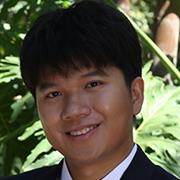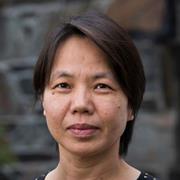Electrical and Computer Engineering
Spring: Sep 15
Summer: n/a
Part-time (Daytime)
Overview
With expert faculty, cutting-edge research, and innovative facilities, electrical and computer engineering doctoral students at Tufts have the opportunity and resources to make significant contributions to the field and become leaders in industry, government, and academia.
Program Highlights
The Department of Electrical and Computer Engineering is a growing interdisciplinary department with a focus on research and education in a wide variety of sub-disciplines, ranging from image and signal processing to nanoscale engineering.
Past dissertations have explored solid-state materials with an emphasis on optoelectronic and solar energy applications, microwave devices and systems, microwave thermography, electromagnetics, antennas, plasma physics, small computers, microprocessor applications, computer architecture, multiprocessing, VLSI design, VLSI CAD, microelectronics, communications systems, information theory, signal processing, digital electronics, Fourier optics, coherence theory, image analysis, nonlinear optics, and circuit theory.
Career Outcomes
Tufts electrical and computer engineers go on to great things. Some are entrepreneurs, founding or working at start-ups. Others are pursuing careers at some of the world's leading technology companies, like Google, Amazon Robotics, Fitbit, Nest, and Intel, or have used their engineering education in different industries altogether, going to work for Fidelity Investments and the New York Stock Exchange.
Application Requirements
Applicants to the doctoral program in electrical and computer engineering are expected to have a degree at the level of bachelor's or master's in electrical or computer engineering, or a related discipline such as computer science, physics, or mathematics.
- Application Fee
- Resume/CV
- Personal Statement
- Transcripts
- Three letters of recommendation
- GRE General Test scores are not required
- Official TOEFL, IELTS, or Duolingo test scores (if applicable)
- Portfolio (optional)
Tuition and Financial Aid
We recognize that attending graduate school involves a significant financial investment. Our team is here to answer your questions about tuition rates and scholarship opportunities.
Please contact us at gradadmissions@tufts.edu.
Faculty

Thomas Vandervelde

Thomas Vandervelde
Research/Areas of Interest: Interaction of light with matter, physics of nanostructures and interfaces, metamaterials, material science, plasmonics, and surfactants, semiconductor photonics and electronics, epitaxial crystal growth, materials and devices for energy and infrared applications.

Shuchin Aeron

Shuchin Aeron
Research/Areas of Interest: Machine Learning, Statistical Signal Processing, Information Theory, Optimal Transport

Steven Bell

Steven Bell
Research/Areas of Interest: Engineering education, embedded systems, camera systems and computational photography

Marco Donato

Marco Donato
Research/Areas of Interest: emerging technologies, non-volatile memories, SoC design, hardware for machine learning, noise modeling and reliability

Mark Hempstead

Mark Hempstead
Research/Areas of Interest: computer architecture, computer systems, power-aware computing, embedded systems, mobile computing, computer systems for machine learning, workload characterization, quantum computing, learning sciences and computer systems for human subjects research

Valencia Koomson

Valencia Koomson
Research/Areas of Interest: design of silicon-based mixed-mode VLSI systems (analog, digital, RF, optical), analog signal processing, and optoelectronic system-on-chip modeling and integration for applications in optical wireless communication and biomedical imaging

Sunil Kumar

Sunil Kumar
Research/Areas of Interest: Performance evaluation and control of manufacturing systems, service operations, and communications networks, Optimization methods and control theory

Yingjie Lao

Yingjie Lao
Research/Areas of Interest: trusted AI, hardware security, electronic design automation, VLSI architectures for machine learning and emerging cryptographic systems, and AI for healthcare and biomedical applications.

Ron Lasser

Ron Lasser
Research/Areas of Interest: digital image processing, computer animation, swarm robotics, innovation, engineering method & design

Peter Lu

Peter Lu
Research/Areas of Interest: Scientific machine learning: physics-informed ML, representation learning, generative modeling, interpretability; Complex systems: nonlinear dynamics, chaos, interacting quantum systems, materials science, fluid turbulence Website: https://petery.lu

Eric Miller

Eric Miller
Research/Areas of Interest: Statistical- and physics-based signal and image modeling and processing, tomographic image formation and object characterization, and inverse problems. Applications explored include human performance assessment, materials science, airport security, medical imaging, environmental monitoring and remediation, unexploded ordnance remediation, and automatic target detection and classification.

Aseema Mohanty

Aseema Mohanty
Research/Areas of Interest: nanophotonics, optical beam shaping, neuroengineering, chip-scale imaging and microscopy, quantum information systems Research Website: https://sites.tufts.edu/amohanty/

Karen Panetta

Karen Panetta
Research/Areas of Interest: Signal processing; image processing; simulation modeling

Paul Simmonds

Paul Simmonds
Research/Areas of Interest: Experimental development of novel semiconductor nanostructures for quantum information sciences. Tailoring crystal symmetry and strain at the nanoscale to produce next generation optoelectronic devices. AREAS OF RESEARCH EXPERTISE • MBE growth, chamber maintenance, and system support. • Low-temperature, high-field magnetoresistance quantized carrier/spin transport (quantum Hall effects, Shubnikov-de Haas oscillations, 1D quantized conductance, 0.7 structure, etc.). • Atomic force microscopy (AFM), transmission electron microscopy (TEM), X-ray diffraction (XRD) and photoluminescence (PL), Raman spectroscopy, ellipsometry, Rutherford back scattering, etc. • Cleanroom-based micro/nanofabrication including photo- and e-beam-lithography, metallization, and device packaging

Sameer Sonkusale

Sameer Sonkusale
Research/Areas of Interest: Bioelectronics, Biomedical microdevices, Wearables, Ingestibles, Biomedical circuits and systems, micro and nano fabrication, lab-on-chip microsystems, global health and precision medicine, CMOS image sensors for scientific imaging, analog to information converters, analog computing, brain inspired machine learning, active metamaterial devices, circuits, and systems, terahertz devices and circuits

Mai Vu

Mai Vu
Research/Areas of Interest: machine learning, applied optimization, wireless communications and networks, 5G/6G systems and techniques

Corey White

Corey White
Research/Areas of Interest: (opto)electronics and photonics, compound semiconductors, emerging materials, epitaxial growth, hetero- and nano-structures, applications in sensing, integrated photonics, and quantum information systems